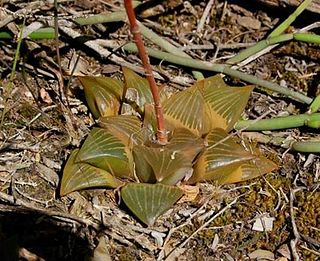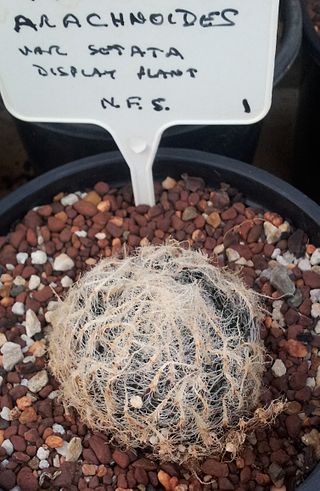
Haworthia is a large genus of small succulent plants endemic to Southern Africa (Mozambique, Namibia, Lesotho, Eswatini and South Africa).

Gasteria is a genus of succulent plants, native to South Africa and the far south-west corner of Namibia.

Bulbine is a genus of plants in the family Asphodelaceae and subfamily Asphodeloideae, named for the bulb-shaped tuber of many species. It was formerly placed in the Liliaceae. It is found chiefly in Southern Africa, with a few species extending into tropical Africa and a few others in Australia and Yemen.

Haworthiopsis coarctata, formerly Haworthia coarctata, is a species of flowering succulent plant from the Eastern Cape Province, South Africa and naturalized in Mexico. It is one of the species of Haworthiopsis that is commonly cultivated as an ornamental.

Haworthia truncata, locally known as horse's teeth, is a species of succulent plant in the genus Haworthia. It is found in the Little Karoo region, in the far east of the Western Cape Province, South Africa.

Haworthia magnifica is a species of the genus Haworthia belonging to the family Asphodelaceae.

Haworthia mirabilis is a species of the genus Haworthia belonging to the family Asphodelaceae.

Haworthia bolusii is a species of Haworthia that was originally described by John Gilbert Baker in 1880.

Tulista is a small genus of succulent plants endemic to the Cape Provinces of South Africa. They were formerly included within the genus Haworthia.

Haworthia cooperi is a diverse and varied species of the genus Haworthia in the family Asphodelaceae, endemic to the Eastern Cape Province in South Africa.

Haworthia retusa is a species of flowering plants of the genus Haworthia in the family Asphodelaceae, endemic to a very small area around Riversdale, in the Western Cape Province in South Africa. Growing to 10 cm (3.9 in) tall and broad, it is a perennial succulent with thick triangular leaves and small white tubular flowers held in 50 cm (20 in) tall racemes.

Haworthia mucronata is a species of the genus Haworthia in the family Asphodelaceae, endemic to the Little Karoo region, in the Western Cape Province of South Africa.

Haworthiopsis scabra, formerly Haworthia scabra, is a species of flowering succulent plant from arid regions of the Western and Eastern Cape Provinces, South Africa.

Haworthia zantneriana is a species of the genus Haworthia in the family Asphodelaceae, subfamily Asphodeloideae, endemic to the southern parts of the Western Cape and Eastern Cape Provinces in South Africa.

Haworthiopsis bruynsii, formerly Haworthia bruynsii, is a rare species of the genus Haworthiopsis in the family Asphodelaceae, endemic to a small area in the Eastern Cape Provinces in South Africa.

Haworthia arachnoidea, locally known as "papierrosie" (paper-rose) or "spinnekopnes" (spider-nest), is the type species of the genus Haworthia, in the family Asphodelaceae, in the Western Cape Province of South Africa.

Haworthia turgida, also sometimes known as the windowpane plant, is a species of Haworthia native to the Cape Provinces. Its common name comes from the translucent panes on its leaves, which are similar to those of Haworthia cooperi and some other species in the genus. It grows in dense clusters of offsets from the base, and in its native habitat prefers rocky limestone or slate cliffs. The main type has pale green leaves but varies widely. Varieties include Haworthia turgida var. longibracteata (M.B.Bayer) and Haworthia turgida var. suberecta (Poelln.)

Haworthia floribunda is a species of succulent plant in the genus Haworthia native to the Cape Province of South Africa. It grows in rosettes with dark green, lanceolate leaves that curve or twist outward. The leaves may be smooth or, in H. floribunda var. dentata, have small teeth.

Haworthia reticulata is a species of succulent plant native to the southwestern Cape Provinces of South Africa. The species has several varieties, including var. hurlingii which is the smallest at up to 1 inch (2.5 cm) wide.






















